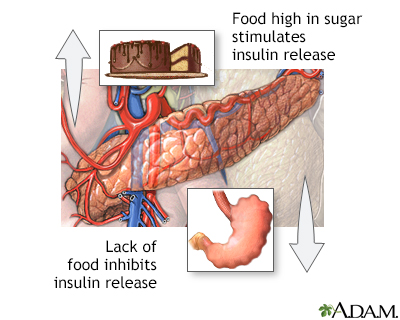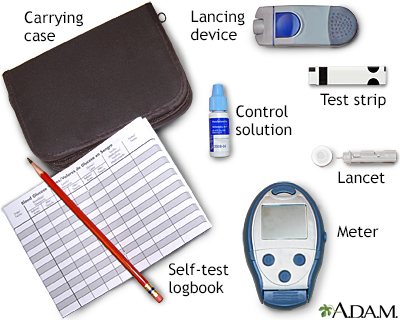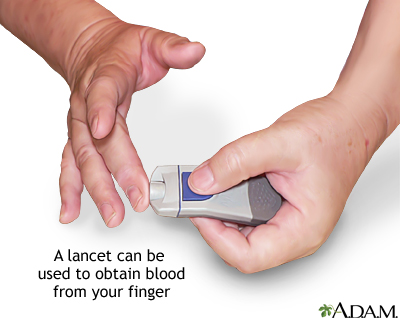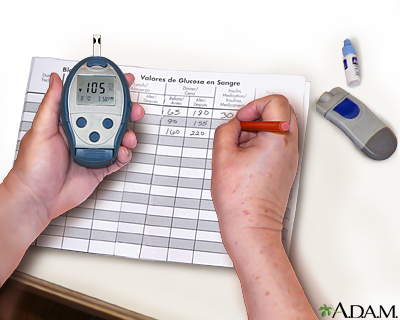Diabetes
Diabetes - type 1; Diabetes - type 2; Diabetes - gestational; Type 1 diabetes; Type 2 diabetes; Gestational diabetes; Diabetes mellitusDiabetes is a long-term (chronic) disease in which the body cannot regulate the amount of sugar in the blood.
Causes
Insulin is a hormone produced by the pancreas to control blood sugar. Diabetes can be caused by too little insulin, resistance to the action of insulin, or both.
To understand diabetes, it is important to first understand the normal process by which food is broken down and used by the body for energy. Several things happen when food is digested and absorbed:
- A sugar called glucose enters the bloodstream. Glucose is a source of fuel for the body.
- An organ in the upper abdomen, below and behind the stomach, called the pancreas makes insulin. The role of insulin is to move glucose from the bloodstream into muscle, fat, and other cells, where it can be stored or used as fuel.
Food and insulin release
Insulin is a hormone secreted by the pancreas in response to increased glucose levels in the blood.
People with diabetes have high blood sugar because their body cannot move sugar from the blood into muscle and fat cells to be burned or stored for energy, or because their liver makes too much glucose and releases it into the blood. This is because:
- Their pancreas does not make enough insulin
- Their cells do not respond to insulin normally (also called insulin resistance)
- Both of the above
There are two major types of diabetes. The causes and risk factors are different for each type:
Type I diabetes
In response to high levels of glucose in the blood, the insulin-producing cells in the pancreas secrete the hormone insulin. Type I diabetes occurs when these cells are destroyed by the body's own immune system.
-
Type 1 diabetes is less common, accounting for 5% to 10% of people with diabetes in the United States. It can occur at any age, but it is most often diagnosed in children, teens, or young adults. In this disease, the body makes little or no insulin. This is because the pancreas cells that make insulin are damaged by an immune process and stop working. Daily injections of insulin are needed. The exact cause of the immune process is unknown.
Type 1 diabetes
Type 1 diabetes is a lifelong (chronic) disease in which there is a high level of sugar (glucose) in the blood.
 ImageRead Article Now Book Mark Article
ImageRead Article Now Book Mark Article -
Type 2 diabetes is more common, accounting for 90% to 95% of people with diabetes in the United States. It most often occurs in adulthood, but because of high obesity rates, children and teens are now being diagnosed with this disease. Some people with type 2 diabetes do not know they have it. With type 2 diabetes, the body is resistant to insulin and doesn't use insulin as well as it should. Not all people with type 2 diabetes are overweight or obese.
Type 2 diabetes
Type 2 diabetes is a lifelong (chronic) disease in which there is a high level of sugar (glucose) in the blood. Type 2 diabetes is the most common f...
 ImageRead Article Now Book Mark Article
ImageRead Article Now Book Mark Article - There are other causes of diabetes, and some people cannot be classified as type 1 or type 2. Examples include LADA (latent autoimmune diabetes in adults, a variant of type 1 diabetes), MODY (maturity-onset diabetes of the young), and diabetes due to other illnesses.
Gestational diabetes is diagnosed when high blood sugar develops at any time during pregnancy in a woman who does not already have diabetes.
Gestational diabetes
Gestational diabetes is high blood sugar (glucose) that starts or is first diagnosed during pregnancy.

If your parent, brother, or sister has diabetes, you are more likely to develop the disease.
Symptoms
A high blood sugar level can cause several symptoms, including:
- Blurry vision
- Excess thirst
-
Fatigue
Fatigue
Fatigue is a feeling of weariness, tiredness, or lack of energy.
 ImageRead Article Now Book Mark Article
ImageRead Article Now Book Mark Article - Frequent urination
- Hunger
- Weight loss
Because type 2 diabetes develops slowly, some people with high blood sugar have no symptoms.
Symptoms of type 1 diabetes typically develop over a short period, usually weeks to months. People may be very sick by the time they are diagnosed.
After many years, diabetes can lead to other serious problems. These problems are known as diabetes complications, and include:
-
Eye problems, including trouble seeing (especially at night), light sensitivity, cataracts, and blindness
Eye problems
Diabetes can harm the eyes. It can damage the small blood vessels in the retina, the back part of your eye. This condition is called diabetic retin...
 ImageRead Article Now Book Mark Article
ImageRead Article Now Book Mark Article - Sores and infections of the toe, foot, or leg, which if untreated, can require amputation of the affected area
-
Damage to nerves in the body, causing pain, tingling, a loss of feeling, problems digesting food, and erectile dysfunction
Damage to nerves in the body
Nerve damage that occurs in people with diabetes is called diabetic neuropathy. This condition is a complication of diabetes.
 ImageRead Article Now Book Mark Article
ImageRead Article Now Book Mark Article -
Kidney problems, which can lead to kidney failure
Kidney problems
Kidney disease or kidney damage often occurs over time in people with diabetes. This type of kidney disease is called diabetic nephropathy.
 ImageRead Article Now Book Mark Article
ImageRead Article Now Book Mark ArticleKidney failure
Chronic kidney disease is the slow loss of kidney function over time. The main job of the kidneys is to remove wastes and excess water from the body...
 ImageRead Article Now Book Mark Article
ImageRead Article Now Book Mark Article - Weakened immune system, which can lead to more frequent infections
- Increased chance of having a heart attack or stroke
Heart attack
Most heart attacks are caused by a blood clot that blocks one of the coronary arteries. The coronary arteries bring blood and oxygen to the heart. ...
 ImageRead Article Now Book Mark Article
ImageRead Article Now Book Mark ArticleStroke
A stroke occurs when blood flow to a part of the brain stops. A stroke is sometimes called a "brain attack. " If blood flow is cut off for longer th...
 ImageRead Article Now Book Mark Article
ImageRead Article Now Book Mark Article
Diabetic retinopathy
Diabetes causes an excessive amount of glucose to remain in the blood stream which may cause damage to the blood vessels. Within the eye the damaged vessels may leak blood and fluid into the surrounding tissues and cause vision problems.
Exams and Tests
A urine analysis may show high urine sugar. But a urine test alone does not diagnose diabetes.
Urine analysis
Urinalysis is the physical, chemical, and microscopic examination of urine. It involves a number of tests to detect and measure various compounds th...

Your health care provider may suspect that you have diabetes if your blood sugar level is 200 milligrams per deciliter (mg/dL) or 11.1 millimoles per liter (mmol/L) or higher. To confirm the diagnosis, one or more of the following tests must be done.
Blood tests:
-
Fasting blood glucose level. Diabetes is diagnosed if the fasting glucose level is 126 mg/dL (7.0 mmol/L) or higher on two different tests, when the person is in their usual state of health. Levels from 100 mg/dL to 125 mg/dL (5.6 mmol/L to 7.0 mmol/L) are called impaired fasting glucose or prediabetes. These levels are risk factors for developing type 2 diabetes.
Fasting blood glucose level
A blood sugar test measures the amount of sugar (glucose) in a sample of your blood. Glucose is a major source of energy for most cells of the body, ...
 ImageRead Article Now Book Mark Article
ImageRead Article Now Book Mark Article -
Hemoglobin A1C (A1C) test. Normal is less than 5.7%; prediabetes is 5.7% to 6.4%; and diabetes is 6.5% or higher.
Hemoglobin A1C
A1C is a lab test that shows the average level of blood sugar (glucose) over the previous 3 months. It shows how well you are controlling your blood...
 ImageRead Article Now Book Mark Article
ImageRead Article Now Book Mark Article -
Oral glucose tolerance test. Diabetes is diagnosed if the glucose level is 200 mg/dL (11.1 mmol/L) or higher 2 hours after drinking a special 75 gram sugar drink. This test is used most often for type 2 diabetes and is rarely needed for type 1 diabetes.
Oral glucose tolerance test
The glucose tolerance test is a lab test to check how your body moves sugar from the blood into tissues like muscle and fat. The test is often used ...
 ImageRead Article Now Book Mark Article
ImageRead Article Now Book Mark Article
Screening for type 2 diabetes in people who have no symptoms is recommended for:
-
Adults who are overweight or obese (BMI of 25 kilograms per square meter or higher in most adults or BMI of 23 or higher in Asian Americans) starting at age 35 repeated every 3 years
Overweight
Overweight and obesity mean having a weight than is higher than what is healthy for a given height. A person may be overweight from extra muscle, bo...
 ImageRead Article Now Book Mark Article
ImageRead Article Now Book Mark Article - Women who are overweight and have other risk factors such as high blood pressure who are planning to become pregnant
High blood pressure
Blood pressure is a measurement of the force exerted against the walls of your arteries as your heart pumps blood to your body. Hypertension is the ...
 ImageRead Article Now Book Mark Article
ImageRead Article Now Book Mark Article - All adults age 35 or older, repeated every 3 years or at a younger age if the person has risk indicators such as high blood pressure, dyslipidemia, established cardiovascular disease, history of gestational diabetes/polycystic ovary syndrome/HIV, prediabetes, exposure to medicines known to cause diabetes, or having a mother, father, sister, or brother with diabetes.
In 2022, the US Preventive Services Task Force concluded that there was not enough evidence to recommend screening for type 2 diabetes in all people 18 years old or younger. Some experts do advocate such screening for overweight children. Ask your child's provider what is best for them.
Treatment
Type 2 diabetes can sometimes be reversed with lifestyle changes, especially losing weight with exercise and by eating different foods. Some cases of type 2 diabetes can also be improved with weight loss surgery.
There is no cure for type 1 diabetes (except for a pancreas or islet cell transplant).
Treating either type 1 diabetes or type 2 diabetes involves nutrition, activity and medicines to control blood sugar level.
Everyone with diabetes should receive proper education and support about the best ways to manage their diabetes. Ask your provider about seeing a certified diabetes care and education specialist (CDCES).
Getting better control over your blood sugar, cholesterol, and blood pressure levels helps reduce the risk for kidney disease, eye disease, nervous system disease, heart attack, and stroke.
To minimize diabetes complications, visit your provider at least 2 to 4 times a year. Talk about any problems you are having. Follow your provider's instructions on managing your diabetes.
Support Groups
Many resources can help you understand more about diabetes. If you have diabetes, you can also learn ways to manage your condition and prevent diabetes complications.
Resources
The following sites provide further information on diabetes:American Diabetes Association -- diabetes. orgCenters for Disease Control and Prevention ...

More information and support for people with diabetes and their families can be found at :
- American Diabetes Association -- www.diabetes.org
- National Institute of Diabetes and Digestive and Kidney Diseases -- www.niddk.nih.gov/health-information/diabetes
Outlook (Prognosis)
Diabetes is a lifelong disease for most people who have it.
Tight control of blood glucose can prevent or delay diabetes complications. But these problems can occur, even in people with good diabetes control.
Possible Complications
After many years, diabetes can lead to serious health problems:
- You could have eye problems, including trouble seeing (especially at night), cataracts, and light sensitivity. You could become blind.
- Your feet and skin can develop sores and infections. After a long time, your foot or leg may need to be amputated. Infection can also cause pain and itching in other parts of the body.
- Diabetes may make it harder to control your blood pressure and cholesterol. This can lead to a heart attack, stroke, and other problems. It can become harder for blood to flow to your legs and feet.
- Nerves in your body can get damaged, causing pain, tingling, and numbness.
- Because of nerve damage, you could have problems digesting the food you eat. You could feel weakness or have trouble going to the bathroom. Nerve damage can make it harder for men to have an erection.
- High blood sugar and other problems can lead to kidney damage. Your kidneys may not work as well as they used to. They may even stop working so that you need dialysis or a kidney transplant.
- Your immune system can weaken, which can lead to frequent infections.
Prevention
Keeping an ideal body weight and an active lifestyle may prevent or delay the start of type 2 diabetes. If you're overweight, losing just 5% of your body weight can reduce your risk. Some medicines can also be used to delay or prevent the start of type 2 diabetes.
At this time, type 1 diabetes cannot be prevented. But there is promising research that shows type 1 diabetes may be delayed in some high risk people.
References
Ahmann AJ, Riddle MC. Therapeutics of type 2 diabetes mellitus. In: Melmed S, Auchus RJ, Goldfine AB, Rosen CJ, Kopp PA, eds. Williams Textbook of Endocrinology. 15th ed. Philadelphia, PA: Elsevier; 2025:chap 34.
American Diabetes Association Professional Practice Committee. 2. Diagnosis and classification of diabetes: standards of care in diabetes-2025. Diabetes Care. 2025;48(Supplement_1):S27-S49. PMID: 39651986 pubmed.ncbi.nlm.nih.gov/39651986/.
Gillard P, Atkinson MA, Mathieu C. Type1 diabetes mellitus. In: Melmed S, Auchus RJ, Goldfine AB, Rosen CJ, Kopp PA, eds. Williams Textbook of Endocrinology. 15th ed. Philadelphia, PA: Elsevier; 2025:chap 35.
US Preventive Services Task Force; Davidson KW, et al. Screening for prediabetes and type 2 diabetes: US Preventive Services Task Force Recommendation Statement. JAMA. 2021;326(8):736-743. PMID: 34427594 pubmed.ncbi.nlm.nih.gov/34427594/.
US Preventive Services Task Force; Mangione CM, Barry MJ, et al. Screening for prediabetes and type 2 diabetes in children and adolescents: US Preventive Services Task Force Recommendation Statement. JAMA. 2022;328(10):963-967. PMID: 36098719 pubmed.ncbi.nlm.nih.gov/36098719/.
-
Endocrine glands - illustration
Endocrine glands release hormones (chemical messengers) into the bloodstream to be transported to various organs and tissues throughout the body. For instance, the pancreas secretes insulin, which allows the body to regulate levels of sugar in the blood. The thyroid gets instructions from the pituitary to secrete hormones which determine the rate of metabolism in the body (the more hormone in the bloodstream, the faster the chemical activity; the less hormone, the slower the activity).
Endocrine glands
illustration
-
Diabetic retinopathy - illustration
Diabetes causes an excessive amount of glucose to remain in the blood stream which may cause damage to the blood vessels. Within the eye the damaged vessels may leak blood and fluid into the surrounding tissues and cause vision problems.
Diabetic retinopathy
illustration
-
Islets of Langerhans - illustration
Islets of Langerhans contain beta cells and are located within the pancreas. Beta cells produce insulin which is needed to metabolize glucose within the body.
Islets of Langerhans
illustration
-
Pancreas - illustration
The pancreas is located behind the liver and is where the hormone insulin is produced. Insulin is used by the body to store and utilize glucose.
Pancreas
illustration
-
Insulin pump - illustration
The catheter at the end of the insulin pump is inserted through a needle into the abdominal fat of a person with diabetes. Dosage instructions are entered into the pump's small computer and the appropriate amount of insulin is then injected into the body in a calculated, controlled manner.
Insulin pump
illustration
-
Type I diabetes - illustration
In response to high levels of glucose in the blood, the insulin-producing cells in the pancreas secrete the hormone insulin. Type I diabetes occurs when these cells are destroyed by the body's own immune system.
Type I diabetes
illustration
-
Diabetic blood circulation in foot - illustration
People with diabetes are at risk for blood vessel injury, which may be severe enough to cause tissue damage in the legs and feet.
Diabetic blood circulation in foot
illustration
-
Food and insulin release - illustration
Insulin is a hormone secreted by the pancreas in response to increased glucose levels in the blood.
Food and insulin release
illustration
-
Insulin production and diabetes - illustration
Insulin is a hormone produced by the pancreas that is necessary for cells to be able to use blood sugar.
Insulin production and diabetes
illustration
-
Monitoring blood glucose - series - Using a self-test meter
Presentation
-
Necrobiosis lipoidica diabeticorum - abdomen - illustration
Necrobiosis lipoidica diabeticorum is a chronic skin disease characterized by shiny plaques that vary in color from light yellowish to reddish-tan. It is seen more commonly in women. Although the name implies diabetes and the majority of cases occur in diabetics, this condition can occur in individuals without diabetes.
Necrobiosis lipoidica diabeticorum - abdomen
illustration
-
Necrobiosis lipoidica diabeticorum - leg - illustration
Necrobiosis lipoidica diabeticorum is a chronic skin disease characterized by shiny plaques that vary in color from light yellowish to reddish-tan. It is seen more commonly in women. Although the name implies diabetes and the majority of cases occur in diabetics, this condition can occur in individuals without diabetes.
Necrobiosis lipoidica diabeticorum - leg
illustration
-
Endocrine glands - illustration
Endocrine glands release hormones (chemical messengers) into the bloodstream to be transported to various organs and tissues throughout the body. For instance, the pancreas secretes insulin, which allows the body to regulate levels of sugar in the blood. The thyroid gets instructions from the pituitary to secrete hormones which determine the rate of metabolism in the body (the more hormone in the bloodstream, the faster the chemical activity; the less hormone, the slower the activity).
Endocrine glands
illustration
-
Diabetic retinopathy - illustration
Diabetes causes an excessive amount of glucose to remain in the blood stream which may cause damage to the blood vessels. Within the eye the damaged vessels may leak blood and fluid into the surrounding tissues and cause vision problems.
Diabetic retinopathy
illustration
-
Islets of Langerhans - illustration
Islets of Langerhans contain beta cells and are located within the pancreas. Beta cells produce insulin which is needed to metabolize glucose within the body.
Islets of Langerhans
illustration
-
Pancreas - illustration
The pancreas is located behind the liver and is where the hormone insulin is produced. Insulin is used by the body to store and utilize glucose.
Pancreas
illustration
-
Insulin pump - illustration
The catheter at the end of the insulin pump is inserted through a needle into the abdominal fat of a person with diabetes. Dosage instructions are entered into the pump's small computer and the appropriate amount of insulin is then injected into the body in a calculated, controlled manner.
Insulin pump
illustration
-
Type I diabetes - illustration
In response to high levels of glucose in the blood, the insulin-producing cells in the pancreas secrete the hormone insulin. Type I diabetes occurs when these cells are destroyed by the body's own immune system.
Type I diabetes
illustration
-
Diabetic blood circulation in foot - illustration
People with diabetes are at risk for blood vessel injury, which may be severe enough to cause tissue damage in the legs and feet.
Diabetic blood circulation in foot
illustration
-
Food and insulin release - illustration
Insulin is a hormone secreted by the pancreas in response to increased glucose levels in the blood.
Food and insulin release
illustration
-
Insulin production and diabetes - illustration
Insulin is a hormone produced by the pancreas that is necessary for cells to be able to use blood sugar.
Insulin production and diabetes
illustration
-
Monitoring blood glucose - series - Using a self-test meter
Presentation
-
Necrobiosis lipoidica diabeticorum - abdomen - illustration
Necrobiosis lipoidica diabeticorum is a chronic skin disease characterized by shiny plaques that vary in color from light yellowish to reddish-tan. It is seen more commonly in women. Although the name implies diabetes and the majority of cases occur in diabetics, this condition can occur in individuals without diabetes.
Necrobiosis lipoidica diabeticorum - abdomen
illustration
-
Necrobiosis lipoidica diabeticorum - leg - illustration
Necrobiosis lipoidica diabeticorum is a chronic skin disease characterized by shiny plaques that vary in color from light yellowish to reddish-tan. It is seen more commonly in women. Although the name implies diabetes and the majority of cases occur in diabetics, this condition can occur in individuals without diabetes.
Necrobiosis lipoidica diabeticorum - leg
illustration
-
Diabetes
(Alt. Medicine)
-
Diabetes diet - InDepth
(In-Depth)
-
Diabetes - type 1 - InDepth
(In-Depth)
-
Diabetes - type 2 - InDepth
(In-Depth)
Review Date: 1/10/2025
Reviewed By: Sandeep K. Dhaliwal, MD, board-certified in Diabetes, Endocrinology, and Metabolism, Springfield, VA. Also reviewed by David C. Dugdale, MD, Medical Director, Brenda Conaway, Editorial Director, and the A.D.A.M. Editorial team.






















